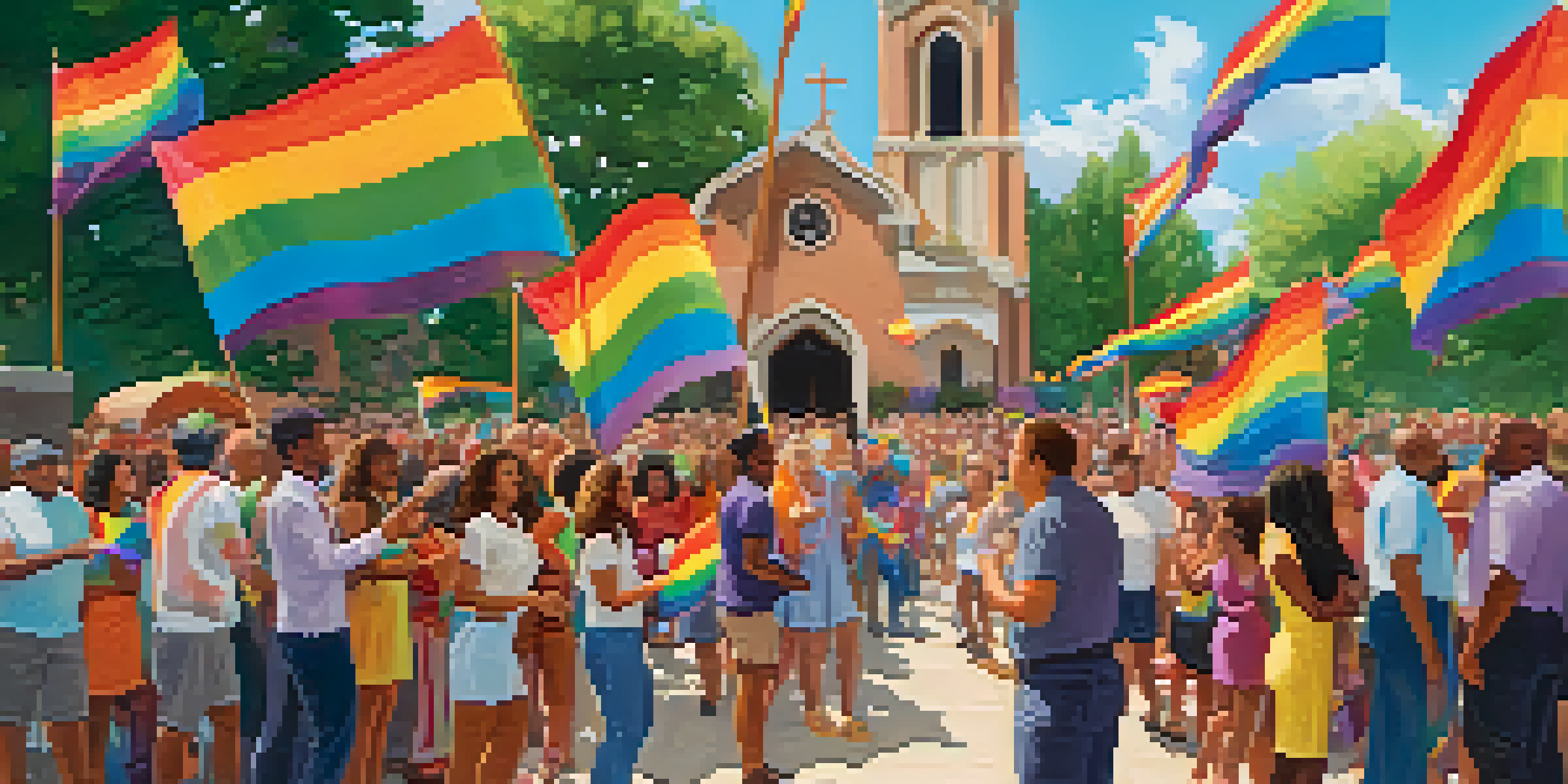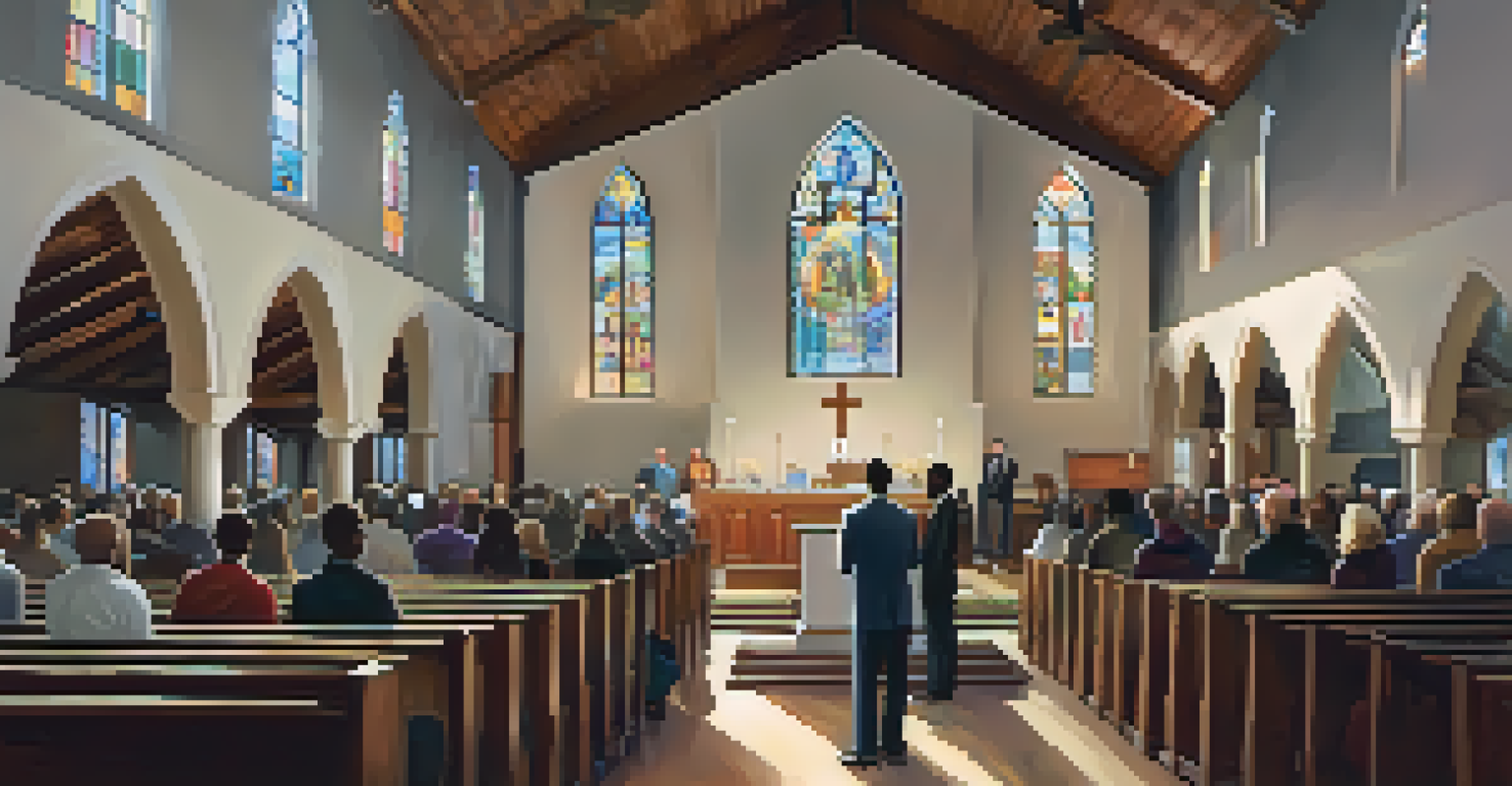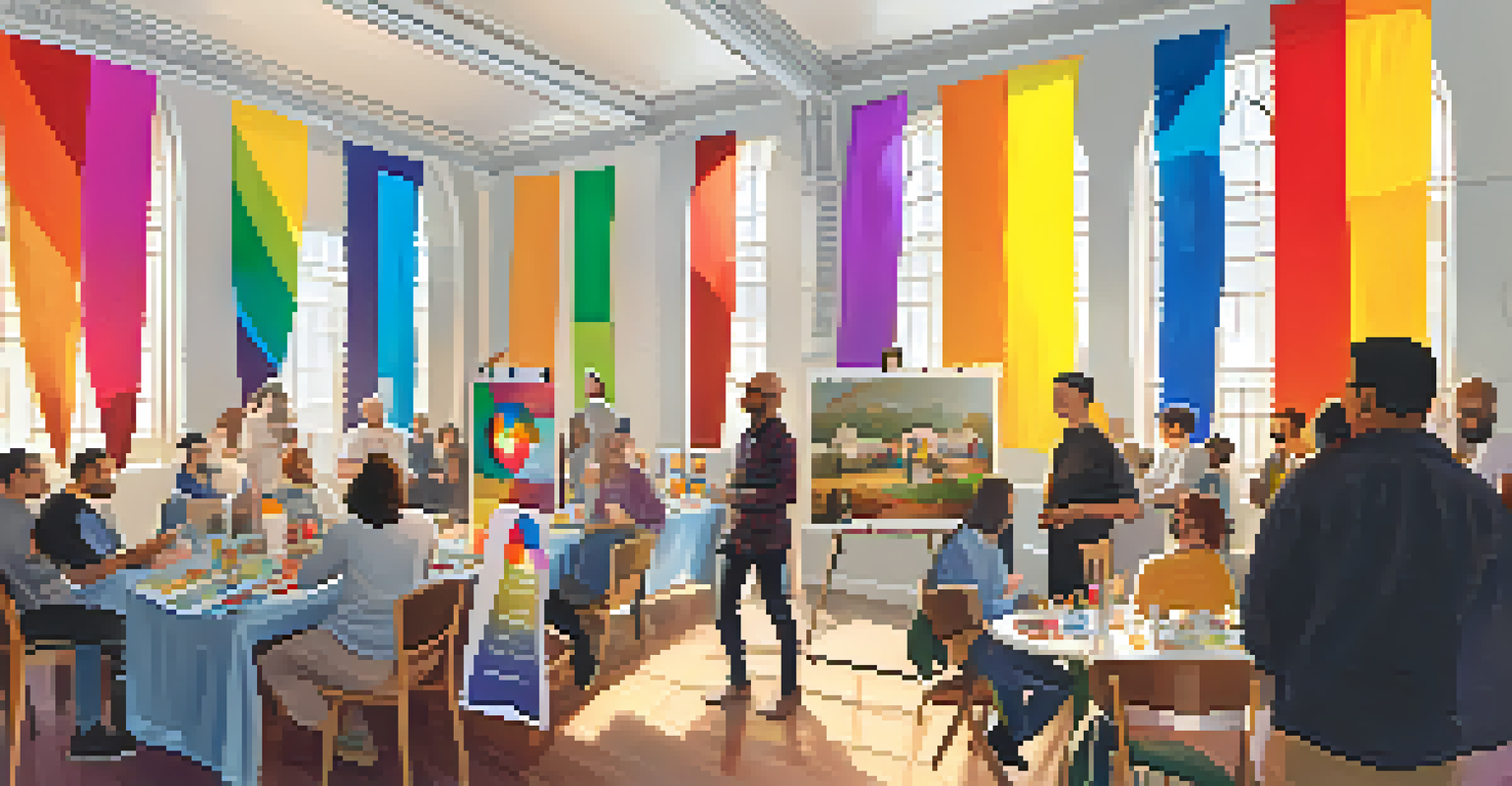The Role of Atlanta's Churches in LGBTQ+ Advocacy

A Historical Overview of LGBTQ+ Advocacy in Atlanta
Atlanta has a rich history of LGBTQ+ advocacy, deeply intertwined with its religious communities. Churches have often served as safe havens for the LGBTQ+ population, especially during times of widespread discrimination. The fight for equality in Atlanta dates back to the 1970s, with many religious leaders stepping up to support the cause.
Injustice anywhere is a threat to justice everywhere.
In the early days, this advocacy was often met with resistance, but many churches began to embrace inclusivity and compassion. The transformation of attitudes within these religious spaces has been pivotal in shaping the broader acceptance of LGBTQ+ individuals in society. This shift reflects a growing recognition of the importance of love and acceptance over judgment.
Today, we see a diverse range of churches actively participating in LGBTQ+ advocacy, showcasing how faith and acceptance can coexist. These efforts highlight a significant cultural shift within Atlanta, proving that religious institutions can indeed be champions of social justice.
Prominent Churches Leading the Charge for Equality
Several churches in Atlanta have become well-known for their commitment to LGBTQ+ advocacy. For instance, the Cathedral of St. Philip openly welcomes LGBTQ+ individuals, providing a supportive environment where everyone is celebrated. This church, among others, actively participates in Pride events and supports local LGBTQ+ organizations.

Another notable example is the Unity of Atlanta Church, which has a long-standing history of promoting inclusivity. They not only host events specifically for the LGBTQ+ community but also incorporate messages of acceptance into their regular services. This approach fosters a sense of belonging and reinforces the idea that faith can be a source of strength for marginalized groups.
Churches as Advocates for LGBTQ+ Rights
Many churches in Atlanta actively support LGBTQ+ advocacy, demonstrating that faith and inclusivity can coexist.
These churches serve as beacons of hope, demonstrating that faith can indeed align with the principles of equality and acceptance. Their leadership in advocacy efforts helps to bridge gaps and create dialogues within the broader community.
Community Events and Activism Initiated by Churches
Atlanta's churches have taken an active role in organizing community events aimed at raising awareness about LGBTQ+ issues. Many churches host forums, workshops, and discussions that educate congregants and the wider community about the challenges faced by LGBTQ+ individuals. These events foster understanding and build solidarity among diverse groups.
Faith is taking the first step even when you don't see the whole staircase.
In addition to educational events, churches often partner with LGBTQ+ organizations to provide resources and support. This collaboration can include everything from fundraising to hosting support groups for LGBTQ+ youth. Such initiatives not only provide practical help but also create a visible presence of allyship in the community.
These community events play a crucial role in normalizing conversations about LGBTQ+ rights within faith spaces. By bringing people together in a spirit of love and understanding, churches help to cultivate a more inclusive culture.
Challenges Faced by Churches in Advocacy Work
While many churches have embraced LGBTQ+ advocacy, challenges still exist. Some congregations face pushback from within their communities, particularly from more conservative members who may not support inclusive practices. This internal conflict can create a tense atmosphere, making it difficult for churches to fully commit to advocacy without division.
Moreover, churches sometimes struggle with the broader societal stigma surrounding LGBTQ+ issues. In a city like Atlanta, where progress has been made, there are still areas where acceptance is not guaranteed. This can make it challenging for churches to navigate their roles as advocates while maintaining their mission and values.
Community Engagement Through Events
Atlanta's churches organize educational forums and workshops to raise awareness about LGBTQ+ issues and foster solidarity.
Despite these challenges, many churches remain steadfast in their commitment to LGBTQ+ advocacy. They continue to promote dialogue, educate their congregations, and stand firm against discrimination, showcasing resilience in the face of adversity.
The Role of Pastoral Leadership in Advocacy
Pastoral leadership plays a significant role in shaping a church's stance on LGBTQ+ issues. Many progressive pastors openly advocate for inclusivity, using their platforms to challenge traditional views and encourage acceptance. Their leadership often inspires congregants to embrace the LGBTQ+ community and engage in advocacy efforts.
Through sermons, community outreach, and personal interactions, these leaders can influence attitudes and foster a culture of love within their congregations. They often share personal stories and biblical interpretations that emphasize compassion, thereby creating an environment where individuals feel safe to explore their identities.
The impact of pastoral leadership extends beyond the church walls, influencing the broader community. By modeling inclusive behavior, these leaders encourage others to join the fight for equality, demonstrating the profound effect of faith-based advocacy.
The Intersection of Faith and LGBTQ+ Identity
For many LGBTQ+ individuals, reconciling their faith with their identity can be a complex journey. Churches that embrace advocacy offer a space where people can explore this intersection without fear. This acceptance is essential for fostering mental and emotional well-being among LGBTQ+ individuals who may have faced rejection in other faith contexts.
These churches often provide resources, counseling, and support groups specifically tailored for LGBTQ+ individuals, helping them navigate their faith journeys. By addressing the unique challenges they face, these churches empower individuals to embrace both their faith and their identity authentically.
Challenges in Promoting Inclusivity
Despite their commitment to LGBTQ+ advocacy, churches often face internal resistance and societal stigma that complicate their efforts.
The intersection of faith and LGBTQ+ identity is a powerful narrative that illustrates the potential for harmony between the two. Churches that prioritize acceptance and understanding help to create a supportive environment where everyone can thrive.
Looking Forward: The Future of Faith and LGBTQ+ Advocacy
As Atlanta continues to evolve, the role of churches in LGBTQ+ advocacy will likely expand. With younger generations increasingly valuing inclusivity, churches that embrace these ideals may attract new members and foster a more vibrant community. This shift presents an opportunity for faith communities to lead by example in promoting acceptance.
Moreover, as social justice movements gain momentum, churches can serve as vital allies in the fight for LGBTQ+ rights. Their unique ability to reach diverse audiences positions them to educate and influence public opinion, creating a ripple effect of change.

Looking ahead, the collaboration between faith communities and LGBTQ+ organizations will be crucial. Together, they can work towards building a more inclusive society where love, acceptance, and advocacy go hand in hand.